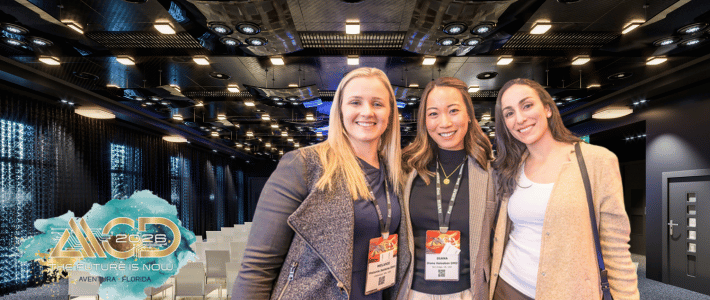The American Academy of Cosmetic Dentistry (AACD) is proud to recognize the hard work and dedication of the following students for their work on research that was submitted for review in competitions that were to be held at the 38th Annual AACD Scientific Session in Orlando, Florida. The AACD Poster Competition creates an outlet for undergraduate and postgraduate students, junior dental faculty, along with clinicians and researchers, to share their scientific findings and to promote greater interaction within the dental community. Even though we were not able to meet in person, we still wanted to share this exciting research with everyone.
2022 POSTER COMPETITION WINNERS
 1st Place Winner Undergraduate Clinical Case
1st Place Winner Undergraduate Clinical Case
Steven Katz
New York University College of Dentistry
Elevating A Smile After Orthodontics Using Feldspathic Porcelain Veneers
When a patient desires to elevate their smile after finishing their orthodontic treatment, dental practitioners can depend on restorative materials to help achieve their desired aesthetic goals. Minimal preparation with feldspathic porcelain veneers is an ultra-conservative choice for aesthetic treatment that can enhance the shape and color of teeth. When tooth preservation is the patient's priority, the combination of supportive orthodontics, minimal preparation, and good communication with the dental lab technician is key to accomplishing these aesthetic goals.
CC: “I just finished my Invisalign and hate my smile. They’re straight, but I have translucent, chipped edges. I want white, straight across teeth” This case shows a method in elevating a patient’s smile, by rejuvenating shape and color, using aesthetic principles and materials, when orthodontics alone can’t fulfill a desired result.
Faculty Mentors: John Calamia, DMD, Dr. Nicholas J. Giannuzzi, Larry Passaro
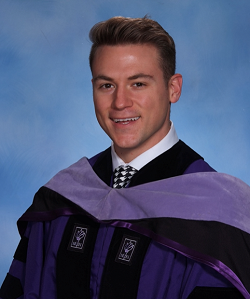
2nd Place Winner Undergraduate Clinical Case
Andrew Shupe
New York University College of Dentistry
Elevating A Smile After Orthodontics Using Feldspathic Porcelain Veneers
Chief Complaint: “I don’t like the gaps between my teeth, and I want to have a beautiful white smile”
Open gingival embrasures, or “black triangles”, are caused by gingival recession, which occurs when the gum recedes away from the teeth. Gingival recession stems from a variety of different factors including, but not limited to, aging, abrasive dental hygiene methods, and gum or bone disease. This issue, no matter the origin, can cause a person to become insecure about their teeth and the overall look of their smile.
Previous dental history included a 5-unit bridge placed on teeth 23-27 which now presented loose and deemed to be no longer acceptable to the patient.
Most recent dental therapy done at NYUCD included newly placed implant crowns on teeth 3, 14, 19 and 30.
A comprehensive treatment plan was established in order to address the patient’s goals/expectations without sacrificing oral function. The treatment plan included feldspathic porcelain veneers on teeth 4-13, 20, 21, 28, 29, extraction of teeth 23/26 and a PFM bridge #22-27.
Faculty Mentors: John Calamia, DMD, Larry Passaro

3rd Place Winner Undergraduate Clinical Case
Sara Alonso
New York University College of Dentistry
Laser Gingivectomy and Polychromatic
Gingival symmetry and biologic width play a vital role in the perception of an overall pleasing smile. When planning procedures such as soft tissue crown lengthening, the successful outcome of a direct restoration will be related to the ability of the clinician to control the surgical site. The use of lasers provide benefits that not only enable the dentist to better visualize the site but allows for better control in contouring soft tissue, keeping a harmonious esthetic and functional relationship between the soft tissues of the periodontum and the tooth structure to be restored.
Faculty Mentors: Kenneth Magid, DDS

1st Place Winner Post Graduate Material Science
Nasreen Akbar
Tufts University School of Dental Medicine
The Effect of Milling and Sintering Methods on the Translucency of Polychromatic Zirconia Ceramics
The purpose of this in-vitro study was to investigate and compare the effects of speed sintering and slow sintering duration on the translucency of zirconium oxide ceramics using ZirCAD MT Multi blocks and discs, and Katana STML blocks and discs via spectrophotometry. The null hypotheses were 1) there was a difference between slow sintering and speed sintering, and 2) there was a difference between the two Zirconium materials in translucency.
Faculty Mentors: Aikaterini Papathanasiou DMD, DDS, Aikaterini Kostagianni, DDS, DMD., MS, Yukio Kudara, CDT, MDT, RDT, Matthew D. Finkelman , PhD , Ali Muftu, DMD, MSc
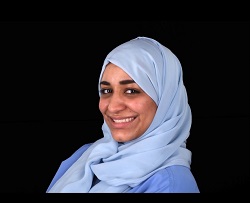
1st Place Winner Post Graduate Clinical Case Shahad Abulhamael
Tufts University School of Dental Medicine
Esthetic Rehabilitation of Maxillary Anterior Teeth Using a Minimal Invasive Approach: A Case Report
A 31-year-old male presented for rehabilitation of his missing maxillary central and lateral incisors. The treatment rendered demonstrates the restoration of severely facially-inclined implants in the esthetic zone. The final prosthesis included the fabrication of a multilayered cement-retained zirconia partial denture (FPD) replacing #7-10 teeth with pink porcelain and full coverage crowns on maxillary canines.
Faculty Mentors: Maria Avrampou, DDS, MS, Dr.med.dent, MAS, DMD, Gustavo Mahn Arteaga, DDS, MS, Aikaterini Papathanasiou, DMD, DDS, Aikaterini Kostagianni, DDS., DMD., MS

2nd Place Winner Post Graduate Clinical Case
Mohanned Alghamdi
Tufts University School of Dental Medicine
The Use of Angulated Screw Abutments in the Esthetic Zone: A Case Report
A 46-year-old male presented for rehabilitation of his maxillary central and lateral incisors. The teeth were periodontally compromised and deemed non-restorable. Extraction of teeth #7-10 was recommended followed by a screw-retained implant-supported fixed dental prosthesis (ISFDP) and crowns on teeth #6 and #11. Inclination of implants #7 and #10 was too facially and did not allow for a conventional screw-retained prosthesis. Thus, this case report describes an alternative design that facilitated the fabrication of a screw-retained ISFPD.
Faculty Mentors: Aikaterini Papathanasiou DMD, DDS, Aikaterini Kostagianni, DDS, DMD, MS, Panagiotis Papaspyridakos DDS, MS, PhD, Maria Avrampou, DDS, MS, Dr.med.dent, MAS, DMD.

3rd Place Winner Post Graduate Clinical Case
Nasreen Akbar
Tufts University School of Dental Medicine
Esthetic Rehabilitation of Maxillary Anterior Teeth
A 50-year-old female presented for replacement of her existing maxillary anterior crowns. Her chief complain was the unnatural appearance of her smile and perception of aged appearance due to the lack of incisal display.
Clinical examination revealed:
-PFM crowns #7-#10, which depicted nonesthetic appearance (axes, shade, form, proportions, texture, etc.)
Faculty Mentors: Aikaterini Papathanasiou DMD, DDS, Panagiotis Papaspyridakos DDS, MS, PhD, Maria Avrampou, DDS, MS, Dr.med.dent, MAS, DMD
2022 HEAPS WINNERS
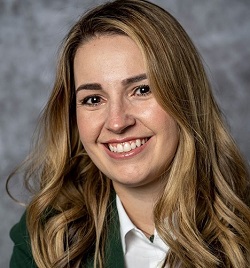 Paula Barbisan
Paula Barbisan
Harvard School of Dental Medicine
Optimizing Esthetics and Function of Anterior Maxillary Teeth Using Lithium Disilicate Ceramic Restorations: A Case Report
45-year-old patient presented with a chief complaint of “I’m not happy with my front teeth appearance. I have fillings on my front teeth, and they have different colors”
- The patient presented with multiple composite resin restorations, performed due to previous caries and black triangles as a result of history of periodontal disease
- Patient’s expectation: achieve a natural smile with a higher value and uniform shade of anterior teeth.
- Provider’s expectation: improve form, function and esthetics.
Faculty Mentor: Hiroe Ohyama DMD, MMSc, PhD, DMD
Click to see a larger view.
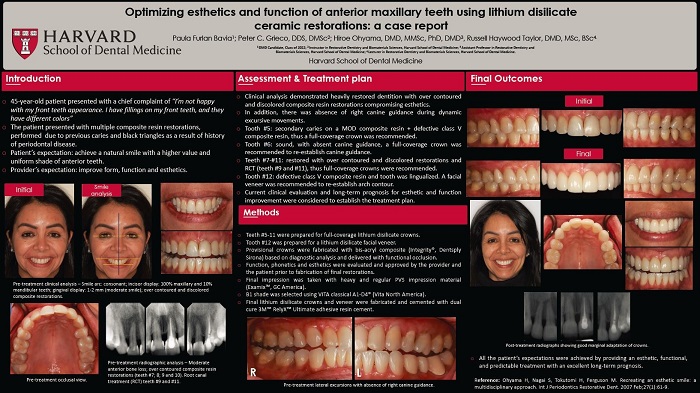
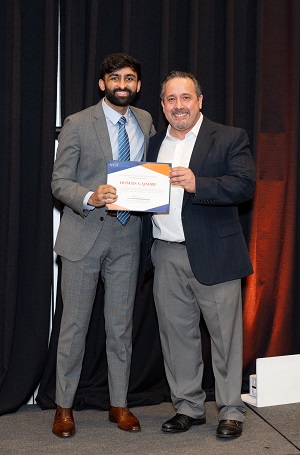 Homais Qadri
Homais Qadri
University of Texas Science Center at Houston School of Dentistry
A New Beginning: Creating Esthetic Results with Non-Ideal Parameters
As the importance of esthetics continues to become more prevalent in our society, clinicians frequently face the task of creating the seamless smile for their patients. Although it is very easy to say, there are numerous clinical variable that are taken into consideration when addressing a patient’s esthetic complaint. The objective of this case is to exhibit how to manage non-ideal situations while creating an esthetically pleasing smile.
In this case, many factors played a role in the treatment planning process and during treatment. The patient ES in this case presented with lingual tipping of #8, three missing anterior teeth, and an occlusal cant. However, with proper treatment planning, great esthetics can be achieved. FPDs/crown were fabricated using esthetic zirconia and the patient was overjoyed with the final result.
Faculty Mentors: DS4; Mentor Claudia Ruiz Brisuela, DDS; Mentor Joe C. Ontiveros, DDS, MS
Click to see a larger view.
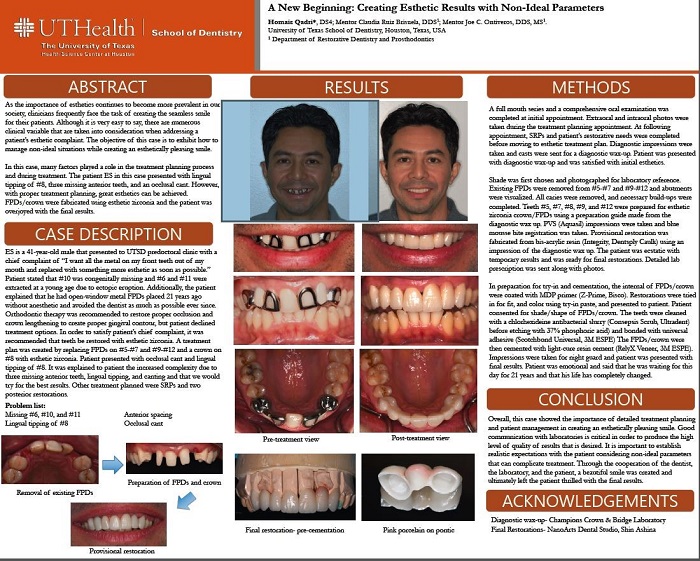
 Fareed Tareen
Fareed Tareen
New York University
Esthetic and Functional Rehabilitation Using Porcelain Fused to Zirconia (PFZ) Restorations
- 82-year-old male presented to Honors Esthetics with chief complaint:
“I want to look like a Hollywood star.”
- Initial conversation focused on understanding patient’s goals and presenting and informing patient about treatment options
- After comprehensive exam, full coverage restorations were decided upon due to patient’s pre-existing heavily restored dentition
Faculty Mentors: Dr. Fred Puccio, Dr. Kenneth Magid, Mr. Larry Passaro
Click to see a larger view.
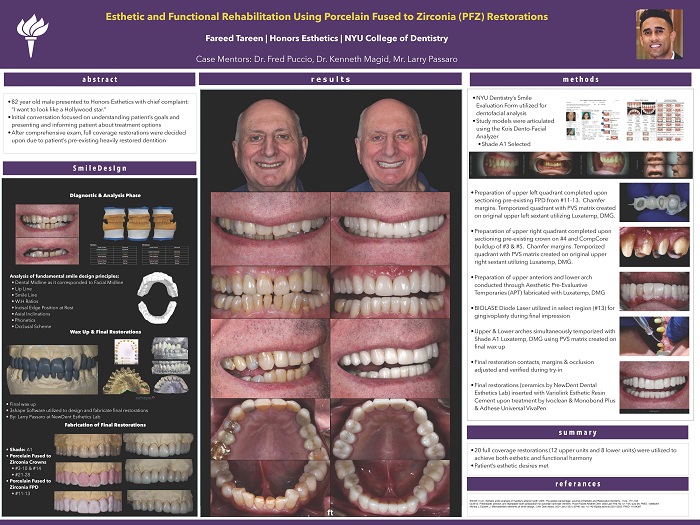
 Rachel Travieso
Rachel Travieso
Nova Southeastern University College of Dental Medicine
Restoring Missing Teeth and Function, Anterior Diastema Closure and Esthetic Improvement Using Implants and Porcelain Fused to Zirconia Crowns
Chief Complaint: “ I want to have implants”
Medical History:
74-year-old male patient taking Losartan 100 mg qd for HTN, Atorvastatin 20 mg qd for high cholesterol, Tamsulosin 0.4 mg qd for benign prostatic hyperplasia, Levothyroxine 50 micrograms gd in the
morning for Hypothyroidism and Allopurinol for gout every other day. Patient denies any allergies, tobacco or drug use, drinks wine socially.
Dental History: Patient presents missing teeth for more than 10
years ago.
Faculty Mentors: Liliana Mosqura, DDS
Click to see a larger view.
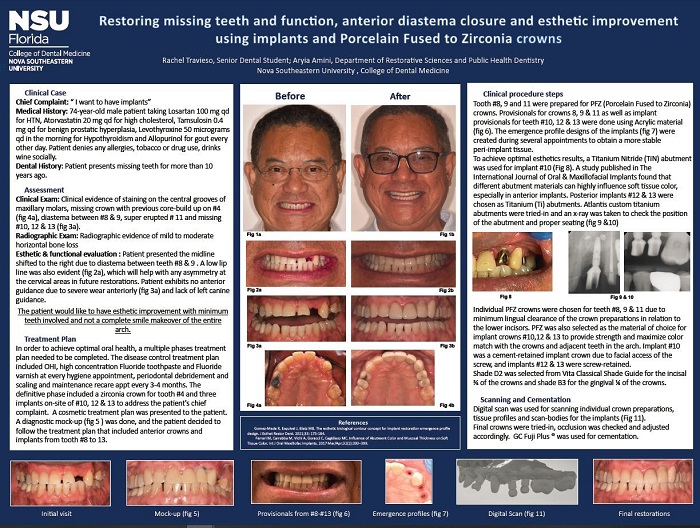
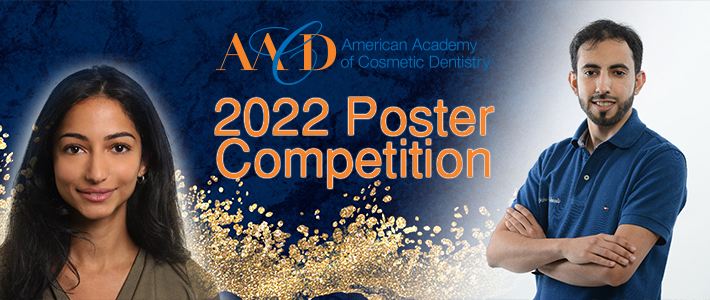


 1st Place Winner Undergraduate Clinical Case
1st Place Winner Undergraduate Clinical Case 




 Paula Barbisan
Paula Barbisan
 Homais Qadri
Homais Qadri
 Fareed Tareen
Fareed Tareen
 Rachel Travieso
Rachel Travieso






